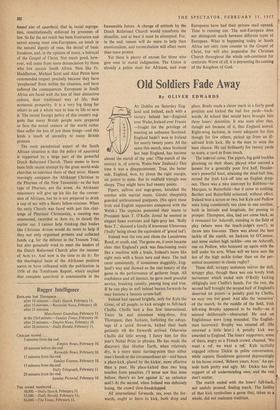Old Soldiers Fade Away
By OLIVER EDWARDS
Pipers, saffron and sage-green, heralded the combat with martial music. Gardai sheepishly guarded unthreatened goalposts. (No spirit these Irish and English supporters compared with the Welsh.) The captains presented their teams to President Sean T. O'Kelly. Jovial he seemed in elegant fawn overcoat and light-grey hat. 'Bully Sean T.,' shouted a kindly if irreverent Ulsterman ('bully' being about the equivalent of 'grand lad').
Ireland won the toss and chose the Lansdowne Road, or south, end. The game on, it soon became clear that England's pack was functioning more like a machine with a brain, Ireland's more like eight men with a brain here and there. The ball came consistently, if sometimes sluggishly, Eng- land's way and showed us the real beauty of the game in the performance of gatherer Jeeps. All confidence and all instinct, he gave most graceful service, breaking cannily, passing long and true. If he can play as well behind beaten forwards he may become a famous scrum-half.
Ireland had opened brightly, only for Kyle the Great, of all people, to kick straight to full-back Challis. Challis had a fine first international. Twice he and attendant wing-three, first Thompson, then Jackson, forfeiting the advan- tage of a quick throw-in, kicked their heels patiently till the forwards arrived. Otherwise Challis did little wrong. I fancy him for this year's Nobel Prize in physics. He has made the discovery that Mother Earth, when relatively dry, is a more static starting-point than either man's hands or the circumambient air—and hence a place-kick, placed by the kicker, more effective than a punt. He place-kicked thus two long touches from penalties. ('I never saw that done before; there's no law against it,' an onlooker said.) At the second, when Ireland was definitely losing, the crowd slow-handelapped.
All international forwards, yes, even the for- wards, ought to learn to kick, both drop and place. Brady made a clever mark in a fairly good position and kicked the ball five yards—back- wards. At school that would have brought him three hours' detention. It was soon after that, though not because of it, that England scored. Right-wing Jackson, in room adequate for him though for few others, picked up from an ill- advised Irish kick. He is the man to seize the least chance. He ran brilliantly for twenty yards to score, a yard in from touch.
The interval came. The pipers, big gold buckles gleaming on their shoes, played what seemed a lament for a generally poor first half. Hender- son's powerful boot, attaining the dead-ball line, turned the Irish kick-off into an English drop- out. There was a nice intercept by Robbins—to Marques, to Butterfield—but it came to nothing. Bartlett and Butterfield scissored, without effect. Ireland won a scrum or two, but Kyle and Pedlow were lying consistently too close to one another, both in latitude and longitude, for passing to prosper. Thompson, alas, had not come back, so it remained for Ashcroft, standing in the field of play (where were the touch-judge's eyes?), to throw into line-outs. There was about the best tackle of the match, on Jackson by O'Connor, and some useless high tackles—one on Ashcroft, one on Pedlow, who bounced up again with the ball under his arm. When will we have seen the last of the high tackle (other than on the per- mitted occasions) in classic rugby?
These dull, scrappy sentences mirror the dull, scrappy play, though there was one lovely Irish movement which ended with O'Reilly kicking obligingly into Challis's hands. For the rest, the second half brought the second half of England's deserved six points—a penalty goal by Challis, an easy one but good. And also the 'sensation' of the match. In the middle of the field, Irish left-wing Brophy appeared to be badly—as it seemed deliberately—obstructed. He and an Englishman were lying wounded. The English- man recovered; Brophy was oxtered off.. (He returned a little later.) A penalty kick was awarded to England. The losers' supporters, some of them, angry as a French crowd, chanted, 'We want a ref, we want a ref.' Kyle tactfully engaged referee Dickie in polite conversation, while captain Henderson gestured deprecatingly to his home crowd, 'Behave yours, boys.' An epi- sode both pretty and ugly. Mr. Dickie has the support of all understanding men, and the rest don't matter.
The match ended with the losers' full-back, , not unduly pressed, finding touch. The futility of that kick symbolises a game that, taken as a whole, did not maintain tradition.


































 Previous page
Previous page